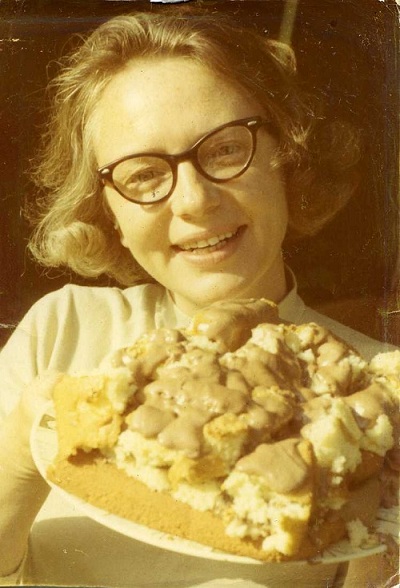I remember sitting on the edge of the examining table in a white paper gown. Dr. Henry Hyatt was in shirt sleeves, just having left his own dying mother’s bedside to attempt to correctly time a once-a-month chance for a fertility treatment for me. At the next office visit, as I sat in another white paper gown, another failed attempt behind me, shoulders bent, I sobbed, “I can’t do it anymore.” I remember him standing in front of me, now motherless in his white coat, with such compassion and regret on his face. “You don’t have to do it anymore,” he said.
My late twenties self worked so hard, months stretching into years, doing everything right, following all of the directions, using the full expanse of my free will and the full strength of my willpower to do everything I possibly could to have a baby. And I could not.
. . . . .
 My late fifties self is just back from another trauma episode. The last one before that was four months ago and I thought I had this.
My late fifties self is just back from another trauma episode. The last one before that was four months ago and I thought I had this.
To the best of my ability to understand, I’ve had an above baseline, chronic whine of anxiety my entire life, probably from attachment issues. I’ll describe those simply as always wishing to receive, sometimes receiving, more often anti-receiving for who I was, for what I was doing, for wanting to receive, for not being able to give correctly. That’s as specific as I want to be about that for now.
I think not being able to have a baby shifted my whine to a moan. Soon after my first marriage ended, I would be awakened at night by the bed shaking, wondering what heavy truck had passed to cause tremors in the foundation. Later, when I woke up with Edvard Munch screams, I learned I was the one shaking and took medication and used my free will and willpower to work hard in individual and group therapy. By 2006, I could sleep through the night.
Then, in 2007, a kid in my classroom pushed me, the Virginia Tech shootings happened, then a kid in my classroom threatened to shoot me.
“Exposure to a trauma trigger subsequently results in a solely involuntarily retrieved memory trace (intrusion), that is very hard to verbalize, often fragmented in time, and consisting for the most part of primary sensory information (images, smell, sounds) that is linked to physiological fear symptoms. Due to the lack of autobiographical context, the memory is relived as happening in the present. Thus a failure to properly consolidate and thus emotionally depotentiate potentially traumatic memories may form the neural basis of key PTSD symptoms like unwanted memories, intrusive flashbacks, nightmares, hyperarousal, and dissociation. Reduction of PTSD symptoms is accomplished by successful transfer to pre-existent, cortical memory circuits.”
– Hein van Marle, PTSD as a memory disorder, 2015
I had nightmares again, I could not calm myself (hyperarousal) and I would lose my self (dissociation).
O, wine, blessed wine at 5:00 PM, how you calmed me and brought me back to myself!
I used the full expanse of my free will and the full strength of my willpower to drink less wine, less often. I could not.
“People suffering from addictions are not morally weak; they suffer a disease that has compromised something that the rest of us take for granted: the ability to exert will and follow through with it.”
– Nora D. Volkow, M.D, Director of the National Institute on Drug Abuse (NIDA), quoted in What We Take for Granted
If I could do it over again, I would do it entirely differently. But I drove myself to a support group meeting and I have been abstinent from alcohol for 3 years.
What happened when I became abstinent? Obvious in hindsight: I had nightmares again, I could not calm myself (hyperarousal) and I would lose my self (dissociation).
I have been using the full expanse of my free will and the full strength of my willpower to engage in all the methods known to treat trauma: medication, individual counseling, dialectical behavior therapy – an aggressive form of cognitive behavior therapy – meditation, exercise and nutrition. I’ve followed research-backed guidance to learn skills to move forward rather than to engage in the increasingly research-backed anti-treatment – desensitization – which can re-traumatize and re-wound while the person retells his or her particular horror.
Having this latest trauma episode just undid me. My last post was published over a month ago. I have had nothing to say.
Today I ask: Are you kidding me?? Is this my life? My best will never, ever be good enough?
That’s a hard one for this American girl – champion of autonomy and self-determination, eldest child of two eldest children, ruggedly individualistic – to take! Born to activist 1960s parents, educated in the can-do 1970s, teaching the philosophy of can-do in the 1980s and 1990s, burned to ash by childlessness and divorce, phoenix-ish by 2006? Come on! Surely it’s my turn for free will and willpower to work!
“[T]hink of addiction as a disease of multiple networks being disrupted…But these networks that are disrupted by drugs do not belong uniquely to addiction….they contribute to the psychopathology of multiple psychiatric diseases…Shizophrenia, ADHD, Post Traumatic Stress Disorder, among others. Which of course gives us an explanation about why these individuals with mental illness are more vulnerable to taking drugs. Because the dopamine enhances the effects of drugs, this will temporarily relieve some of the symptoms. The problem is that with repeated administration it will downregulate their function, exacerbating the clinical presentations of the patients.”
– – Nora D. Volkow, M.D, Director of the National Institute on Drug Abuse (NIDA), Addiction: A Disease of Free Will
My iconoclastic mother had a uniquely dialectical way of saying, “Oh, hell,” both rejecting and accepting broken eggshells having fallen into the cake batter or a button missing from a winter coat on the way out the front door to an appointment. She didn’t want the thing to be, but she wasn’t going to get upset about it. I haven’t heard her voice in over four years, but I hear her…
To having to keep doing it, to trauma disorders, to substance use disorders, and to the frailty of free will and willpower, I utter a hearty version of my mother’s, “Oh, hell.” This is a whole lot of broken eggshells, buttons missing, and white paper gowns.

This is an incredibly powerful post, Ann – especially for those of us who’ve had similar trauma “flashbacks.” Sending supportive vibes ~~~~~